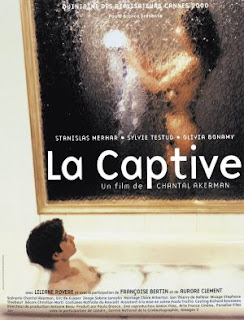 As if to explicitly yell at me you do not know Chantal Akerman as well as you think you do, I came out of La Captive dazed and delightfully confused. Just as one would conceivably get much more out of the Watchmen story if they had actually been patient and just adapted the 12 issues one at a time (this is speculation, I haven’t seen the film, looks awful, won’t see it), this film gives me a much clearer idea of the type of person Marcel Proust is, and what his monumental literary project is going for, than the ambitious but confusing Time Regained by Raul Ruiz. What a strikingly anti-woman film for a supposed feminist to make, as Ariane completely fails to exhibit anything encouraging, or even at all positive, for the female gender. But, of course, I don’t actually think that this film is damning women the world over, and if it is, Akerman if certainly telling this story ironically. As my previous experience with Chantal Akerman was exclusively her early 60s and 70s work, this film was topically surprising, but probably even more formally jarring; the structural minimalism of Hotel Monterrey and the superb News From Home has been thrown out completely.
As if to explicitly yell at me you do not know Chantal Akerman as well as you think you do, I came out of La Captive dazed and delightfully confused. Just as one would conceivably get much more out of the Watchmen story if they had actually been patient and just adapted the 12 issues one at a time (this is speculation, I haven’t seen the film, looks awful, won’t see it), this film gives me a much clearer idea of the type of person Marcel Proust is, and what his monumental literary project is going for, than the ambitious but confusing Time Regained by Raul Ruiz. What a strikingly anti-woman film for a supposed feminist to make, as Ariane completely fails to exhibit anything encouraging, or even at all positive, for the female gender. But, of course, I don’t actually think that this film is damning women the world over, and if it is, Akerman if certainly telling this story ironically. As my previous experience with Chantal Akerman was exclusively her early 60s and 70s work, this film was topically surprising, but probably even more formally jarring; the structural minimalism of Hotel Monterrey and the superb News From Home has been thrown out completely.
But anyway, I thought this was enthralling and deliciously awkward and unsettling. Not sure of what has been changed and retained from Proust’s ‘The Prisoner,’ but the role of the ‘captive’ applies pretty equally to both Ariane and Simon. Simon is locked in his mansion by pollen allergies (allergic to ‘beauty’? one could suppose…), locked emotionally with the idea of being in a relationship with Ariane, and locked by the conventions of his class. Ariane, in the meantime, also locked by conventions, resists her lesbianism for a morbidly boring status with Simon, and is also seemingly locked into her role as a woman: gratingly submissive and defined by her sex. But more than anything, the film looks at a couple that refuses to unite, in which the two partners remains complete individuals. Simon and Ariane have different social circles, different interests, and even different bedrooms in the same mansion. The impossibility of sustaining such a relationship is presented here in all of its aggravating glory. Jealousy inevitably jumps in, and tragedy resolves what the two cannot successfully resolve themselves. This is originally set, I assume, almost a century ago when the books were written, though it seems to have been updated to the present, partially explaining how awkwardly dated some of it feels.
